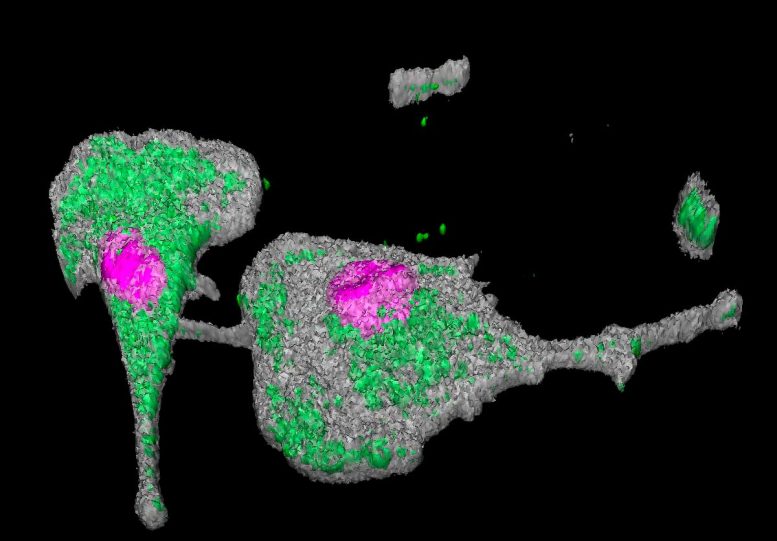The SARS-CoV-2 virus can remain in the lungs for up to 18 months after infection, a study has found, challenging the notion that it is undetectable after initial recovery. This persistence is associated with a failure of the innate immune system. This study confirms the existence of “viral reservoirs” similar to those found in HIV and highlights the role of NK cells in controlling these reservoirs. This discovery is extremely important for understanding long-term COVID-19 infections and the mechanisms of viral persistence.
Groundbreaking research reveals: SARS-CoV-2 Due to malfunctioning of the innate immune system, it can remain in the lungs for months, undetected, leading to long-term COVID-19 infections.
1 to 2 weeks after being infected with the new coronavirus (SARS-CoV-2) virus It is generally undetectable in the upper respiratory tract. But does that mean it's not present in the body? To find out, a team at the Institut Pasteur, which specializes in HIV, teamed up with France's public research institute, the Commission for Alternative Energies and Atomic Energy (CEA), to study lung cells in animal models. It was conducted. This finding not only shows that SARS-CoV-2 can be detected in the lungs of certain individuals for up to 18 months after infection, but also that its persistence is associated with a failure of innate immunity, the first line of defense against the pathogen. It also shows that this is the case. ).This study was published in the journal innate immunology.
Discovery of virus carriers in the new coronavirus infection (COVID-19)
After causing an infection, some viruses remain in the body in a discreet and undetectable form. They remain in what is known as the “viral reservoir.” This is the case with HIV, which is latent in certain immune cells and can reactivate at any time. The same may be the case with the SARS-CoV-2 virus. COVID-19 (new coronavirus infection). At least, this is the hypothesis proposed in 2021 by a team of scientists at the Pasteur Institute, and now confirmed in a preclinical model in non-human primates.
“We observed that inflammation persisted for a long time in primates infected with SARS-CoV-2. We therefore thought that the presence of the virus in the body could be the cause,” said Pass. explains Michaela Müller Tortwin, head of the HIV, Inflammation and Persistence Unit at the Toole Institute.

This study showed that the SARS-CoV-2 virus is transmitted from one macrophage to another through bridge-like cell processes, allowing it to spread. The cell nucleus is highlighted in pink and the viral protein NSP3 is highlighted in green. Credit: © Marie Lazzerini, Nicolas Huot, Institut Pasteur
research result
To study the persistence of the SARS-CoV-2 virus, scientists at the Institut Pasteur collaborated with CEA's IDMIT (Infectious Disease Models for Innovative Therapies) Center to study the persistence of the SARS-CoV-2 virus from animal models infected with the virus. The collected biological samples were analyzed. Early results from the study show that the virus was detected in some people's lungs 6 to 18 months after infection, even though it was not detected in their upper respiratory tract or blood. Another finding was that the amount of residual virus in the lungs was lower with the Omicron strain than with the original SARS-CoV-2 strain.
“We were really surprised that we found the virus in specific immune cells (alveolar macrophages) after such a long period of time and when routine PCR tests were negative,” said the study's lead author. Yes, says Nicolas Huot, a researcher in HIV, inflammation and inflammation at the Institut Pasteur. Persistence unit. “Furthermore, we were able to culture these viruses and use the tools we developed to study HIV to observe that the viruses were still able to replicate.”
To understand the role of innate immunity in controlling these viral reservoirs, scientists next turned to NK (natural killer) cells. “The innate immune cellular response, the body's first line of defense, has so far been little studied in the context of SARS-CoV-2 infection,” says Michaela Müller-Turtwin. “However, it has long been known that NK cells play an important role in controlling viral infections.” The study found that in some animals, macrophages infected with SARS-CoV-2 were destroyed by NK cells. In other animals, NK cells have been shown to adapt to infection and destroy resistant cells (known as adaptive NK cells). For macrophages.
Therefore, this study sheds light on a possible mechanism explaining the existence of 'viral reservoirs'. Those who had little or no virus over time had adaptive NK cell production, whereas those with higher levels of virus not only had no adaptive NK cells, but only cell activation. NK cell activity also decreases. Therefore, innate immunity appears to play a role in controlling persistent SARS-CoV-2 virus.
Future research directions
“We investigated whether the identified viral reservoirs and mechanisms are associated with prolonged COVID-19 cases in a cohort infected with SARS-CoV-2 early in the pandemic. We plan to begin our research. However, the results here already represent an important step in understanding the nature of the virus reservoir and the mechanisms that regulate virus persistence.”Michaela Müller-Turtwin says.
Reference: “SARS-CoV-2 virus persistence in lung alveolar macrophages is controlled by IFN-γ and NK cells”, Nicolas Huot, Cyril Planchais, Pierre Rosenbaum, Vanessa Contreras, Beatrice Jacquelin, Caroline Petitdemange, By Marie Lazzerini, Emma Beaumont, Aurelio Horta-Rezendis, Felix A. Rey, R. Keith Reeves, Roger Le Grand, Hugo Mouquet, Michaela Müller-Tourtuin, November 2, 2023. innate immunology.
DOI: 10.1038/s41590-023-01661-4
This research was primarily funded by families of major donors as part of the Coronavirus Research Program Call for Projects.

